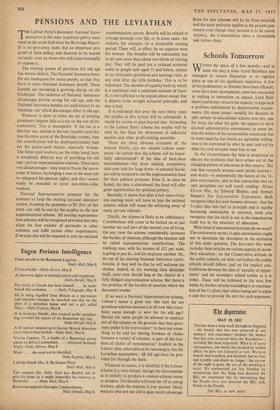PENSIONS AND THE LEVIATHAN
er HE Labour Party's document National Super- annuation is the most important policy state- ment in the social field since the Beveridge Report. It is no give-away show, but an important pro- posal of State policy, and deserves to be treated seriously, even by those who will come eventually to oppose it.
The existing system of provision for old age has serious defects. The National Insurance bene- fits are inadequate for many people, so that they have to claim National Assistance benefit. These benefits are becoming a growing charge on the Exchequer. The existence of National Assistance discourages private saving for old age, and the National Insurance benefits are paid subject to an 'earnings rule' which discourages effort in old age.
Whatever is done to make the lot of existing Pensioners happier falls as a tax on the rest of the community. This is inescapable. If the tax is a flat-rate one, related to flat-rate benefits (and this was the main point of the Beveridge system), then the contributions will be disproportionately high for the poorer-paid worker, especially women. The better-paid workers, on the other hand, have a completely different way of providing for old age—private superannuation schemes. These have two disadvantages : they tend to freeze the move- ment of labour, by keeping a man at the same job to safeguard his pension rights; and they cannot easily be extended to cover non-white-collar ' workers.
National Superannuation proposes for the moment to keep the existing national insurance system, boosting the payments to'13. Part of this extra cost will be met by the surplus on the new superannuation scheme. All existing superannua- tion schemes will be recognised provided that they allow for free transfer of payments to other schemes, and fulfil certain other requirements. Everyone else will be required to join the national superannuation system, Benefits will be related to average earnings over life, or in some cases—for widows, for example—to a favourable earning period. There will, in effect, be no separate rates for women. The benefits will be substantial, but in no case more than about two-thirds of retiring pay. They will be paid (on a reduced actuarial scale) to people now aged 55 and below, subject to no retirement provisions and earnings rules, at any time after the 65th birthday. This is to be welcomed. The element of equality built in, which is a maximum and a minimum amount of bene- fit, is not sufficient to be argued about except that it departs from straight actuarial principle; and that is bad.
It is estimated that over the next thirty years the surplus in this system 'will be substantial. It would be unwise to plan beyond that. According to the Labour Party scheme the surplus will be used by the State for investment in industrial equities and other profit-making securities.
There are three obvious criticisms of the scheme. Firstly, can we—despite Labour assur- ances—be certain that the scheme will be impar- tially administered? If the idea of back-door nationalisation—the State making compulsory take-over bids for large firms—is adopted Social- ists will be tempted to use the superannuation fund for their political purposes. Even if, as must be hoped, the idea is abandoned, the fund will offer great opportunities for political jobbery.
Secondly, it seems that after a few years every- one starting work will have to join the national scheme, which will mean the withering away of many private schemes.
Thirdly, the scheme is likely to be inflationary. Contributions will come to be looked on as just another tax and part of the normal cost of living. On any view the scheme considerably increases the burden of taxation, although the taxation will be called superannuation contributions. The working man, with his income of £1.2 per week, is going to pay 8s., and his employer another 10s., on top of his existing National Insurance contri- butions. It may well be that he will welcome the chance. Indeed, as the working class abolishes itself, most men should leap at the chance of a fully fledged superannuation scheme. But there is the problem of the burden of taxation which the document evades.
if we want a National Superannuation scheme, Labour's seems a good one. But how far are grandiose schemes necessary at all now that every- body earns enough to save for his old age? Should not some people be allowed to contract out of the scheme on the grounds that they genu- inely prefer to be improvident? Is there not some- thing to be said for leaving freedom of choice between a variety of schemes, as part of the free- dom of choice of remuneration? Implicit in the Labour plan, admirable as its reasoning is, lies the Leviathan assumption : all old age must be pro- vided for through the State.
Whatever its merits, it is doubtful if the Labour scheme is a vote-winner, though the Government in its anxiety to produce a counter-scheme seems to disagree. The benefits will seem far off to young workers, while the expense is ever present. Many workers who are too old to gain much advantage from the new schemes will be far from satisfied, and the same probably applies to the present pen- sioners even though their pension is to be raised. Anyway, the Conservatives have a formidable task before them.


































 Previous page
Previous page